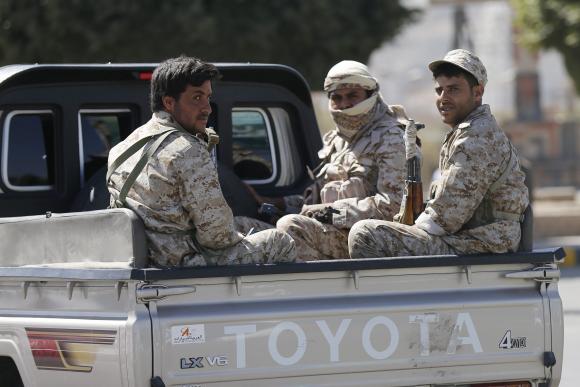
(Reuters) – Yemen’s Houthi rebels welcomed on Thursday proposed concessions by the government on power-sharing but their gunmen still held positions outside the residence of President Abd-Rabbu Mansour Hadi, who remains a virtual prisoner there.
Hadi said on Wednesday he was ready to accept Houthi demands which also include constitutional change, yielding to pressure from the Shi’ite group whose fighters battled their way into the presidential palace this week, after seizing an aide to the president.
A Houthi politburo member said Hadi’s concessions were in line with a peace deal which his group, whose official name is Ansarullah, signed with other political parties when they seized the capital Sanaa in September – a move that helped to cement the rebels’ position as Yemen’s de facto powerbrokers.
“The latest agreement is a series of timed measures to implement the peace and partnership accord, which shows that Ansarullah were not planning to undermine the political process,” politburo member Mohammed al-Bukhaiti told Reuters.
“The agreement is satisfactory because it confirms what is most important in the partnership agreement,” he said.
The withdrawal of the gunmen, and the release of presidential aide Ahmed Awad bin Mubarak could happen in the next three days if the authorities committed to implementing the agreement fully, al-Bukhaiti added.
The rebels’ rise to influence has caused chaos in Yemen and resulted in a shift in its complex web of tribal, religious and regional allegiances. In addition, the Houthis are players in a regional struggle between neighboring Saudi Arabia and Shi’ite Iran.
Suspecting Iranian complicity, the Sunni Muslim authorities in Riyadh cut most of their financial aid to Yemen after the Houthis’ takeover of the capital.
Hadi said on Wednesday he was ready to accept demands for constitutional change and power sharing with the Houthis. Conceding to a major demand, he confirmed in a statement that the draft constitution was subject to amendment and said all sides had agreed that government and state institutions, schools and universities should rapidly return to work.
He also said the Houthis had agreed to leave his private residence and the presidential palace, and to free bin Mubarak, a former presidential nominee whom the Houthis seized on Saturday during a standoff.
But the capital remained largely shut down, witnesses said, even though the airport and seaport in the southern city of Aden resumed work on Thursday, having closed for a day in protest at the Houthi offensive against Hadi’s administration.







